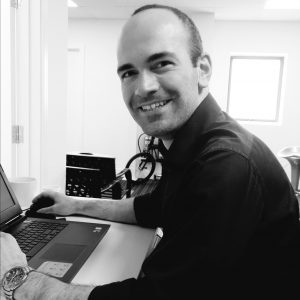
Antonis is a highly experienced Controls & Systems Engineer with a demonstrated history of working in autonomous vehicles and mobile robotics R&D projects within academia and industry. He is a highly skilled architect of complex systems and is now working as Lead Software Engineer at StreetDrone. Antonis is successful in guiding small sized teams and is also a Lifelong Learner. He is knowledgeable in Machine Learning, Computer Vision, Planning & Navigation, ROS & DDS frameworks, and Real-Time Operating Systems. Antonis is very strong in robotics and graduated from the University of Sheffield.
This is a transcription of a live interview between Mike Coraluzzi of MotorSportsCareerAdvisor.com and Antonis Skardasis.
Mike: So Antonis, real quick, let’s get started with these questions. First of all, can you tell us a little bit about your background and where did you go to school or where did you start off? Just like the beginnings of your history.
Antonis: Yes, of course. First of all, thank you again Mike for the invitation. A few words about my background. Basically, I started in Greece. I’m from Athens where I did my first degree in automation and control. I started dealing with autonomous vehicles at the end of my studies around 2008 where I got a scholarship from Cranfield University UK. After spending a few months dealing with UAV technology and path planning, I went back to Athens to finish with my internship there. Around 2013 I continued my studies in Computational Intelligence & Robotics at The University of Sheffield UK, and since then I’ve been working in the field of autonomous vehicles and mobile robotics in various R&D projects in academia and industry.
Mike: That’s awesome. So, I guess this is not new. I mean certainly autonomous vehicles and robotics for sure. But certainly in 2018 it’s on the forefront. It’s everywhere. Can you tell us a little bit about what you’re doing? A little bit, I guess an intro on Street Drone, where you’re at now and what you guys do there.
Antonis: First of all, just to clarify, when I started working with autonomous vehicles I didn’t know it was going to have this explosion in the market. I just did it because I liked it. And I was always fascinated as a kid by science fiction movies, robots etc. So, I decided to do something in my life that would help my daily thirst to research, investigate and learn more about how to make an intelligent machine.
So, I started as a student, then became a professor/teaching assistant, then onto a research assistant. During this period, I took my first steps in the theoretical aspects of this field. And then at some point later, I continued my studies and realized that all of these are nice, but they’re only nice if you apply them inside an academic lab which is a controlled environment. Then it’s like… I can compare it to the Matrix movie – if you remember, there is a scene with the red pill and the blue pill?! So then you realize that in reality you can’t apply these ‘nice’ things you do in a controlled environment at university to the real world necessarily! So, I decided to jump into the industry.
I started with projects as a university employee. Then, I started projects within the industry, and by being closer to the industry, I could see what the real problems were. I could apply all the theories I had learnt as a student from working in the labs and in the classrooms.
So, after two, three, steps let’s say in different companies, and different projects, I ended up at StreetDrone, which is a company that is dealing with autonomous vehicle technologies. They have a few products on the map, with different teams doing a very good job. And that in a nutshell, is my path to StreetDrone. I don’t know if you would like more details than that?
Mike: No, that’s good. So, before we get into Street Drone, so for like a younger student, say someone who’s eighteen, nineteen, twenty years old, something, just getting into college, you said you did projects in some sort of industry even before say research assistant time. Like what are the first steps available? Like for a younger student, freshman, sophomore, or beginning. That students today should think about first steps.
Antonis: Are we talking about jobs after university or when you finish school and you need to pick the next step in your education?
Mike: Yeah, even while you’re in school. Like I don’t know if there’s internships but we have internships here in the U.S. Global jobs while you’re in school. What are the first steps there? Like what kind of industry were you starting with?
Antonis: Well, at that age I just started studying and choosing modules – courses that had elements of math, physics, and programming. In general, the world of autonomous vehicles consists of math, physics, and programming.
Mike: Programming, sure.
Antonis: So, any subject that encompasses software is automatically useful. There are numerous online, free courses. Or if there is a major in school or in university, then it is a good idea to follow that. And always have in mind how you can apply all of this in the real world. In classes it’s nice to have, let’s say assignments, projects, and exercises that you can apply a theory or a method, but the final thought should always be about how this helps me or the rest of the world in real life and how this can be applied.
Mike: And this is not my area of expertise but is there any particular programming languages or courses that come to mind right now that you think are really important?
Antonis: It’s up to the individual what they prefer to do. In the autonomous world, the major languages are the C++ and Python. Many people will say that perhaps Java is also very useful, but the majority of the code in this industry is C++ and Python, for different reasons.
Mike: That’s good to know for young students. They should keep those in mind if they’re just starting. So, that’s great to know. That’s great background. Do you want to jump into describing what’s going on at Street Drone?
Antonis: Yeah, why not? Many things are happening. One of the things is that we have an autonomous-ready vehicle. If someone wants to test their code, for example, if it’s an organization, a test center, a university, then you would like to be able to show people what exactly this algorithm is doing in the real world, rather than doing things in the lab.
So, what you’re going to need is a vehicle to apply all of this. There are many choices, but usually they are expensive. I mean, if you buy a real car and you try, let’s say, to hack it in order to access the individual parts of the car, then this is very expensive. StreetDrone provides an R&D vehicle so research teams can access in a safe way the actuators and the sensors of the vehicle, use their own algorithms and make their own tests.
Mike: Okay, cool. Yeah, an R&D vehicle. And the customers are industry, schools, or both?
Antonis: Both. It is companies wanting to test their individual products. So, for example, take telecom companies – they would like to test 5G connections. Or we have universities looking for something to add to various courses, to aid the students in visualizing exactly what they’re doing, because the computer screen, where you see a nice graph, is completely different from actually seeing your work being applied on a real car.
We have also interest from test centers. So, test centers can benefit from offering testing services to third parties, who come and use the test center facilities, where they may need a platform to plug into and test their tech in controlled environments, like racing tracks for example.
Mike: That’s great to know. I just wrote this down. Do you guys provide-I can’t say just the tools? But you provide the tools. That’s really cool.
Antonis: Yes, indeed. And more to come of course. There are still otherprod ucts to come with the current interest for investment in StreetDrone, but not yet officially launched. It’s not just an autonomous-ready vehicle now – there is a whole platform that supports the vehicle and the people that are working on the vehicle. We haven’t announced it yet though.
Mike: Yep, very interesting. Alright so, on a personal level you guys are creating newxtechnology, new things. What have been some of the biggest challenges-working in new areas that you guys are working on? Maybe like a couple of big challenges.
Antonis: Well I could say that, because this industry is quite young, I could compare it with the computer industry in the seventies say. Which means there are not enough or no standards. So, any group or any team that is working on something in this field is not somehow coordinated. Somehow, we need to unify everything. It would be great for a group to sit at a table and start discussing how we could do things better, and how we can all collaborate without losing time.
There are several teams globally working on the same things independently, which is proven not to be an efficient way to do things – it would be better to work on tasks collaboratively and move faster. All the teams, companies, and organizations working in this field don’t have endless resources. So, if we all collaborate, if we communicate, and create a plan, it will be better for all of us in the long run.
Mike: So, I had a similar conversation. My son does robotics. He’s a teenager. I was having a conversation with someone who was older. My dad used to work in computers way back. Like you said in the seventies and things. They had these big cards. I don’t know what they were called. These data cards that they fed into the computers. It was like programming language. And we were discussing how those cards, those paper cards, have gone from that to a language like C++ and Java and all of that. And then we’re holding these powerful things in our hands called phones.
Now, it’s going to be interesting to see the next jump as now Street Drone is paving that new path, no pun intended. In 40-50 years we’ll look back, I won’t be here. But it will be interesting to see where that goes. So, yeah very cool. Speaking of that, my next was question was where do you see the future of these cars and transport, and I always combine electric vehicles because I’m a fan of that. Where do you see that headed? I know that’s a big question. But what are you guys thinking? What do you see out there?
Antonis: Good question. No one can predict the future. But if you see the flow of the technology and general history, I think the future for vehicles is electric. And in general, the electric future has many positives.
As far as the autonomous vehicle is concerned, I think in the short term all of the companies are going to have vehicles at level three in autonomy. There are five levels, with the fifth level being fully autonomous, where you don’t even need to have a steering wheel or pedals. The car is fully in control. But this is far, far away. As we can see, the technology is not mature enough in order to have the vehicle used by a simple consumer on the street. So, in level three, the vehicle has elements of automation. It can drive autonomously in specific environments, by controlling the steering, the throttle, and the braking. But the driver always makes the final decision and remains responsible for the vehicle. That will be like the low hanging fruit for any company and investor.
Mike: That’s interesting, understood. So, I think we talked about it just a little bit. I have about two questions left. But my next question is what do you see as newer skills that’ll soon be in demand for the future news areas? I know we have languages right now, programming. Anything that students should look out for? Even aside from the language.
Antonis: From my experience, the main thing is programming. Making code for computers is the thing of the future. Whatever job you do, everyone is using computers, and not only that, if you study programming, it helps change your everyday life, your perspective, and how you’re going to structure your time and your functionality in general. So, I think the best thing, the best advice I could give is to be around programming and software because programming is everywhere.
Mike: So, the programming is ahead of the mechanical. I mean really, I guess the mechanical will follow whatever you program. Well I mean, as far as new products and things. Mechanical, it’s not the easier part but who knows? But certainly.
Antonis: From my personal perspective, I think in the field of software there are many more things to come. On the mechanical side there are some constraints because of the nature of things, for example, you can do smaller devices up to a certain point because it’s down to pure physics. On the other hand, you can program anything you want, with any functionality.
Mike: Yep, that’s cool. I’ve certainly learned things and I have one last question. So, we talked about a lot of things. And as far as programming and students going to college and thinking about these areas, from what you’ve experienced what suggestions would you offer to students who are thinking about the job some day? Any final advice for those kids?
Antonis: The only advice I could give is always to do what you really like – what makes you wake up full of passion and interest to read and learn and do things. Money and fame and career will come after.
Mike: That’s cool, that’s great. I’m stalling my questions. And I want to thank you for your time. This was a really good interview. I have a bunch of notes here.
Antonis: Thank you also for the invitation.
Mike: Yes, it was very good. And how do folks get in contact with Street Drone? Is it Streetdrone.com or what are some other ways to get in contact?
Antonis: Streetdrone.com is our website, which houses a lot of information on what we are doing. There are a lot of R&D projects in collaboration with 3rd companies that are not yet on the site. If anyone needs any other information or simply wants to learn more, they can email us at info@streetdrone.com, and we are always happy to discuss in more detail.
Mike: Excellent, that was good. Thank you for your time Antonis!
Antonis: Thank you very much!



